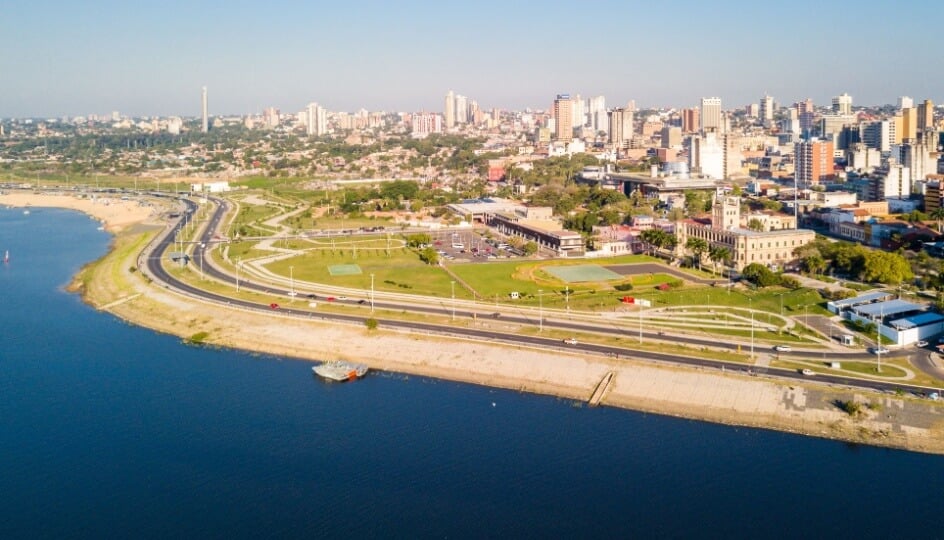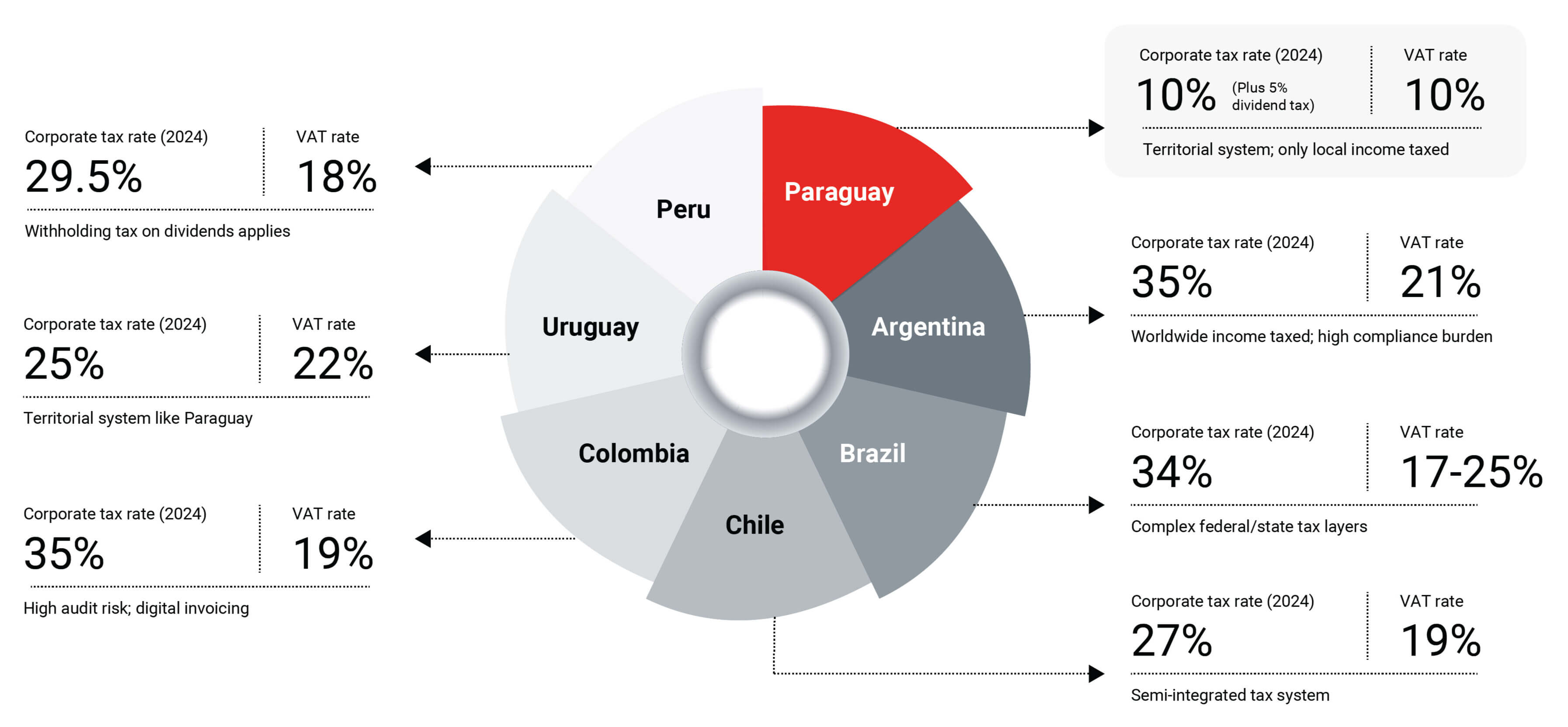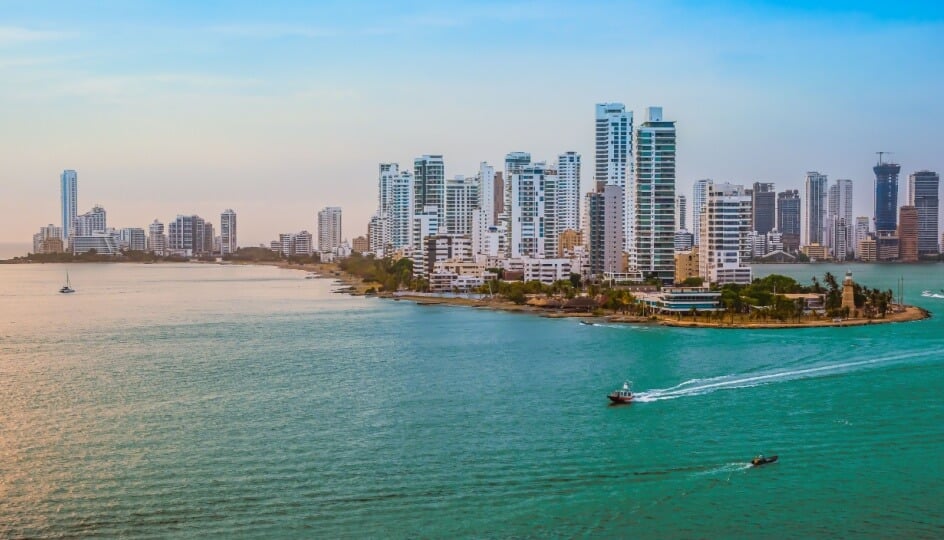Tax compliance in Paraguay: insights for global businesses

With its strategic location, Paraguay offers a unique blend of stability, opportunity and simplicity for businesses seeking regional expansion. Its open economy, investor-friendly policies and competitive tax rates have made it an increasingly attractive destination for foreign direct investment. With a young and growing workforce, improving infrastructure and a government committed to economic reform, Paraguay is positioning itself as a gateway for companies looking to tap into Latin America’s emerging markets.
Thanks to economic diversification efforts and record agricultural production, Paraguay has experienced significant growth over the last few years. It is one of the world’s largest net exporters of clean energy, the largest exporter of organic sugar and the sixth-largest producer of soybeans.
But Paraguay is not just an agricultural nation; it’s also a leading provider of “maquila” services, serving as a hub for manufacturing plants that import and assemble duty-free goods for export. These manufacturing operations allow global businesses to benefit from low-cost labour and pay duty on value-added parts only, enhancing Paraguay’s tax attractiveness.
Tax in Paraguay: the essentials explained
Paraguay’s tax system is designed to be straightforward and accessible, particularly for foreign investors and multinational companies entering the market. With a relatively low tax burden and simplified compliance procedures, Paraguay stands out in the region for its pro-business fiscal framework. The system balances direct and indirect taxation, offering clarity on corporate tax obligations, VAT and sector-specific levies. This level of transparency and predictability makes Paraguay an appealing jurisdiction for companies seeking long-term growth in Latin America.
The Paraguayan tax system is governed by Law 125/91, amended by Law 2421/04 and by Law 5061/2013. Taxes on company incomes include:
- Personal income tax (IRP)
- Corporate income tax – general regime (IRE)
- Tax on profit distribution (IDU)
In addition to direct taxes, the Paraguayan tax system includes two key indirect taxes: Value Added Tax (VAT) and Selective Consumption Tax (ISC).
Any income generated from property or rights within Paraguay is subject to tax. Also, any yields from capital abroad and exchange differences are considered to be sourced in Paraguay if the investing or beneficiary institution is based in the country. The fiscal year follows the calendar year, and foreign tax credits cannot be applied to local tax payments.
Paraguay has signed Double Taxation Agreements with Argentina, Uruguay, Chile, Germany, Belgium and Taiwan.
Corporate tax
Corporations and commercial enterprises are taxed on their Paraguay-sourced income at a flat rate of 10%, making it the lowest corporate income tax in the region. This applies to profits generated from all economic activities, including agricultural, commercial, industrial and service sectors.
Entities established as branches are subject to a 15% withholding tax on remittances to the head office, and a dividend withholding tax may also apply depending on the residency of the shareholders and applicable tax treaties.
Paraguay offers two simplified tax regimes under the Impuesto a la Renta Empresarial (IRE) framework to support small and medium-sized businesses:
IRE RESIMPLE: Designed for sole proprietorships with gross income not exceeding Gs80 million (approximately US$11,000) in the previous fiscal year. Taxpayers under this regime pay a fixed monthly amount based on their income bracket, ranging from Gs20 million to Gs80 million.
IRE SIMPLE: Available to entities with annual income up to Gs2,000 million, this regime allows businesses to determine their net income on either a real or presumed basis – whichever is lower. The applicable tax rate remains 10% on the net taxable income.
These simplified regimes aim to reduce administrative burdens and encourage formalisation among smaller enterprises, making Paraguay an attractive jurisdiction for startups and growing businesses.
To further illustrate Paraguay’s tax competitiveness, the following table compares its corporate income tax rate with those of neighbouring countries and key economies in Latin America. This highlights Paraguay’s appeal to foreign investors seeking cost-efficient jurisdictions for regional operations.
Paraguay’s corporate tax rates vs. regional averages
Key tax filing deadlines in Paraguay
In Paraguay, businesses must comply with various filing deadlines throughout the year. These include monthly returns for routine taxes, annual filing covering yearly obligations and ad hoc submissions for exceptional circumstances.
| Deadline | Obligation |
| Monthly | VAT return and payment |
| Monthly | Payroll tax and social security filings |
| Annual (30 April) | Corporate income tax return (IRE) |
| Annual (31 July) | Transfer pricing report (if applicable) |
| Ad hoc | Dividend withholding tax upon payment |
VAT and excise tax
The sales tax rate also stands at 10% in Paraguay, and its revenue is a vital source of income to the Paraguay government. There is a reduced VAT rate of 5% for pharmaceuticals, the “basic family basket” and agricultural, horticultural and fruit products, as well as property rentals. Exports are not subject to VAT.
There is an excise tax – or selective consumption tax – payable at the time of import or first sale of products such as soft drinks, alcohol, cigarettes and toiletries. That tax must be settled monthly and must be settled before the goods are released from customs. There is also an excise on fuel imports which should be settled weekly. General excise rates include:
- Up to 38% on petroleum-derived fuels
- 18% on cigarettes
- 11% on champagne
- From 8% to 11% on other alcoholic beverages
- From 5% to 6% on soft drinks and juices
- 5% on perfumes, natural pearls, precious stones and metals, watches and bracelets, weapons, ammunition and accessories
Wage taxes and social security
Social security is taxed at 25.5% in Paraguay, of which 16.5% is paid by companies and 9% by employees. It’s levied based on total remuneration, which includes royalties, commissions, perks, severance pay, awards, fees and interests – though it excludes bonuses.
Local taxes
In Paraguay, municipal taxes and fees are paid to each city for a wide range of services and activities, including commercial licences and patents, and taxes on real estate, construction and property.
BEPS and transfer pricing
Paraguay is a signatory to the Multilateral Convention on Mutual Administrative Assistance in Tax Matters, joining more than 100 other jurisdictions to boost transparency and combat cross-border tax evasion. This means that details of financial accounts held in Paraguay will be automatically exchanged with fellow signatories to the Convention. Since 2021, companies have been required to submit a technical transfer pricing report to the tax authority.
Key takeaways
- Paraguay offers a unique blend of stability, opportunity and simplicity for businesses seeking regional expansion
- With a relatively low tax burden and simplified compliance procedures, Paraguay stands out in the region for its pro-business fiscal framework
- Corporations and commercial enterprises are taxed on their Paraguay-sourced income at a flat rate of 10%, making it the lowest corporate income tax in the region
- Paraguay’s simplified tax regimes make the country an attractive jurisdiction for startups and growing businesses
- The sales tax rate stands at 10% and social security is taxed at 25.5%
Ready to simplify your tax strategy in Paraguay?
Whether you're expanding into Latin America or optimising your current operations, understanding Paraguay’s tax system is key to staying compliant and competitive.
Speak to our experts today to ensure your business is set up for success.
Learn more about Paraguay’s business landscape – download the country profile for key insights and analysis.






